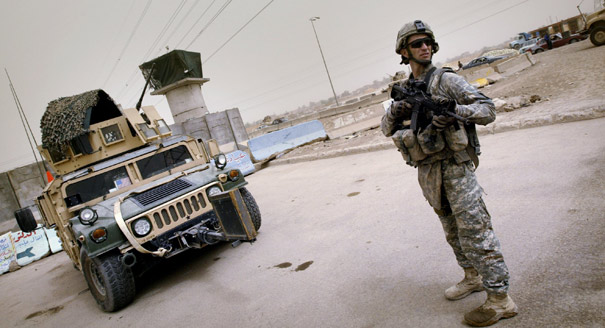Every week a selection of leading experts answer a new question from Judy Dempsey on the foreign and security policy challenges shaping Europe’s role in the world.
John JudisSenior editor of the New Republic and author of Genesis: Truman, American Jews, and the Origins of the Arab-Israeli Conflict
If this question is asking whether the U.S.-led invasion of Iraq failed, that is certainly the case. The invasion led to the deaths of at least several hundred thousand Iraqis, the emigration of thousands more, many of whom were part of the country’s professional class, and the destruction of Iraq’s economy, which was already being crippled by sanctions.
The invasion also inspired the creation within Iraq of al-Qaeda, which had not been welcome under former president Saddam Hussein, and spurred the group’s recruitment elsewhere. It removed a balance of power within the region, and it did not create a democracy, but seems to have replaced an authoritarian Sunni state with a Shia one. The intervention may have set back women’s emancipation. It certainly weakened America’s credibility within the region, and the practice of torture and disregard for civilian lives sullied America’s reputation throughout the world. Last but not least, the invasion cost the U.S. thousands of lives and up to $1 trillion.
A more appropriate question might be whether there are any tiny ways in which hard power has succeeded in Iraq. I can’t think of any right now—but, to echo former U.S. president Dwight Eisenhower when asked about the ideas vice president Richard Nixon had contributed to his administration, give me a few weeks and I might think of one.
Gianni RiottaMember of the Council on Foreign Relations
Yes, U.S. hard power in Iraq has failed. The war begun by former president George W. Bush, the troop surge of 2007, President Barack Obama’s dreams of agreement among the country’s political rivals—all have been unsuccessful.
The government of Iraqi Prime Minister Nouri al-Maliki is sputtering. It has been unable to broker a deal with the country’s Sunni community. Its international agenda is confusing, its oil production reforms are slow, and its approach to Syria is messy. Al-Qaeda’s black flags are flying over the city of Fallujah, but for how long? Al-Qaeda cannot rule Iraq; it can only stir the cauldron of suffering, pain, and strife.
Iraq today resembles a European country during the Middle Ages, or China during the Warlord Era of the early twentieth century: marked by chaos, confusion, and infighting. Paradoxically, only former president Saddam Hussein had the knack for imposing an iron fist on his fellow citizens.






